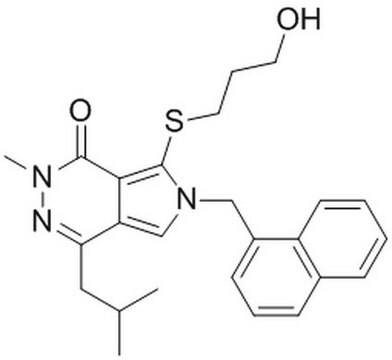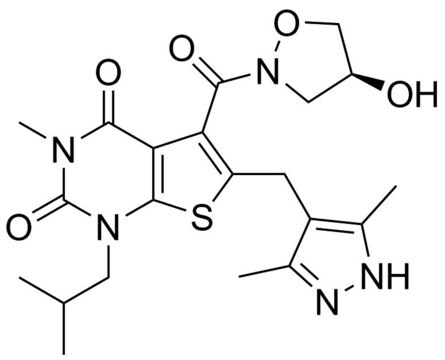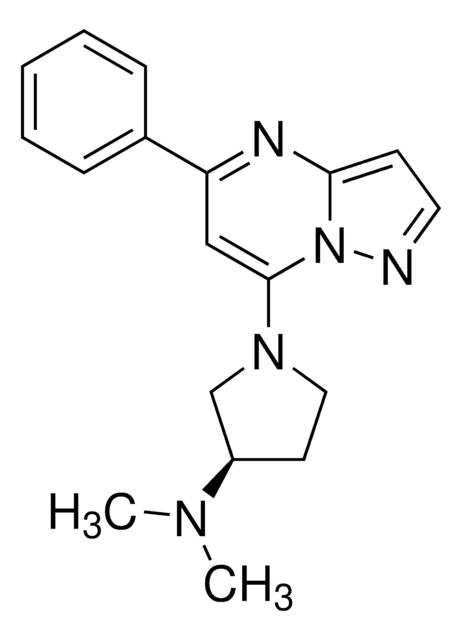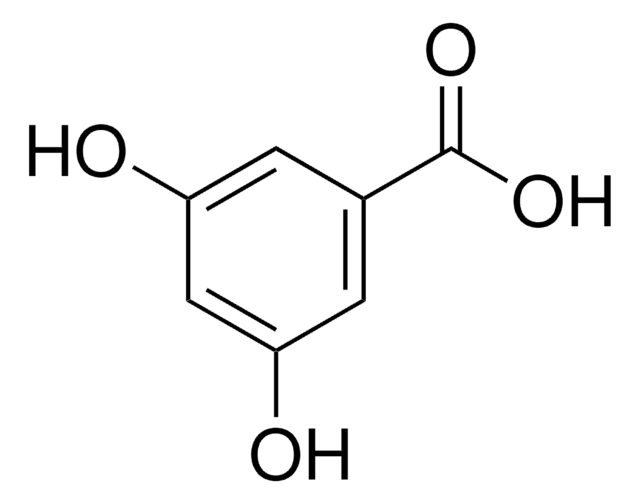Key Documents
SML1908
Syrosingopine
Sinónimos:
(3β,16β,17α,18β,20α)-18-[[4-[(Ethoxycarbonyl)oxy]-3,5-dimethoxybenzoyl]oxy]-11,17-dimethoxy-yohimban-16-carboxylic acid methyl ester, Methyl reserpate ester of syringic acid ethyl carbonate
About This Item
Productos recomendados
form
powder
Quality Level
color
white to light brown
solubility
DMSO: 10 mg/mL, clear
SMILES string
O=C(OC)[C@@H]1[C@]2([H])C[C@@]3([H])C4=C(C5=CC=C(OC)C=C5N4)CCN3C[C@]2([H])C[C@H](OC(C6=CC(OC)=C(OC(OCC)=O)C(OC)=C6)=O)[C@H]1OC
InChI
1S/C35H42N2O11/c1-7-46-35(40)48-31-26(42-3)12-18(13-27(31)43-4)33(38)47-28-14-19-17-37-11-10-22-21-9-8-20(41-2)15-24(21)36-30(22)25(37)16-23(19)29(32(28)44-5)34(39)45-6/h8-9,12-13,15,19,23,25,28-29,32,36H,7,10-11,14,16-17H2,1-6H3/t19-,23+,25-,28-,29+,32+/m1/s1
InChI key
ZCDNRPPFBQDQHR-SSYATKPKSA-N
1 of 4
Este artículo | 21879 | 21884 | 343209 |
|---|---|---|---|
| form solid | form powder | form - | form solid |
| solubility DMSO: 5 mg/mL | solubility DMSO: soluble | solubility DMF: soluble, DMSO: soluble, methanol: soluble | solubility ethanol: soluble |
| storage temp. −20°C | storage temp. 2-8°C | storage temp. −20°C | storage temp. 2-8°C |
| assay ≥95% (HPLC) | assay ≥90.0% (HPLC) | assay ≥85% (HPCE) | assay - |
| Quality Level 100 | Quality Level - | Quality Level - | Quality Level 100 |
Application
- to study its effects on anti-CD147-induced metabolon disruption in human breast cancer cells[1]
- to study its effects on Cryptosporidium parvum-infected HCT-8 cells[2]
- in orthogonal linear separation analysis (OLSA)-derived decomposed analysis[3]
Biochem/physiol Actions
Storage Class
11 - Combustible Solids
wgk_germany
WGK 3
flash_point_f
Not applicable
flash_point_c
Not applicable
Certificados de análisis (COA)
Busque Certificados de análisis (COA) introduciendo el número de lote del producto. Los números de lote se encuentran en la etiqueta del producto después de las palabras «Lot» o «Batch»
¿Ya tiene este producto?
Encuentre la documentación para los productos que ha comprado recientemente en la Biblioteca de documentos.
Los clientes también vieron
Nuestro equipo de científicos tiene experiencia en todas las áreas de investigación: Ciencias de la vida, Ciencia de los materiales, Síntesis química, Cromatografía, Analítica y muchas otras.
Póngase en contacto con el Servicio técnico



















